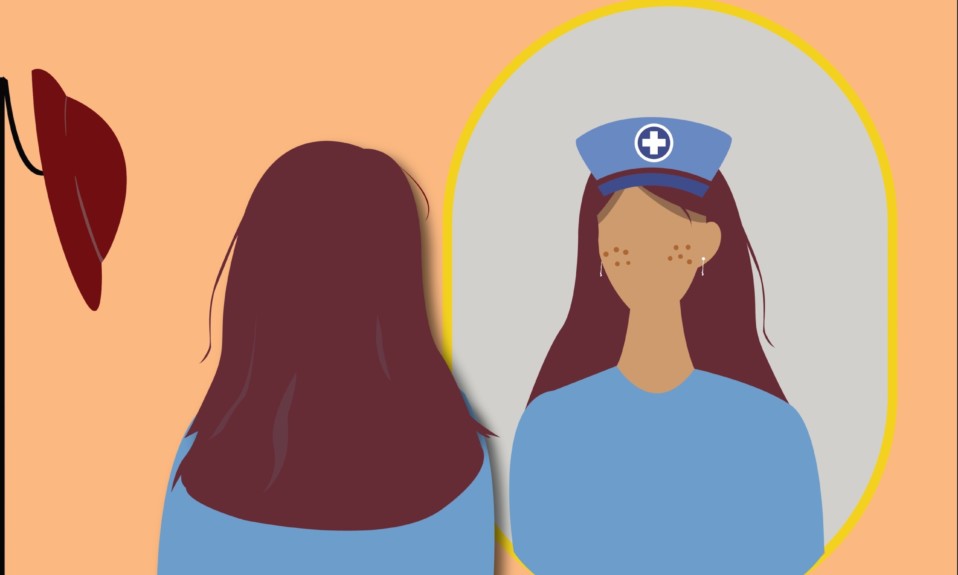It can work as both an advantage and a disadvantage to be a therapist who’s in recovery
By Ryan Blackstock, PsyD
The inspiration for this article came from a dialogue I had with a student who was close to earning her master’s degree. She revealed that she was self-conscious about how and what she should disclose, as a therapist, about her own recovery. Through our dialogue, it was clear that a notion I’ve taken for granted—the two-hat philosophy—had never been passed on to her. Hence, I decided to pass it on to the readership, in case it has never been emphasized to you before.
At the first really good hospital I worked for, Parkside Lodge, it seemed that most colleagues were in recovery of some sort—alcoholism, codependency, eating, etc.—and so the culture of this hospital chain was the two-hat philosophy. The approach was emphasized for all new employees.
I know there’s a popular view that people in recovery make better therapists. As a person in recovery who has been training therapists for a decade, I disagree. There’s no doubt that a person in recovery can provide high-quality therapy. But I’ve also seen the other side of the spectrum.”
What it means is that one hat you wear is that of a recovering person (or it could be as simple as just your personal life), but when you enter the hospital, you put on the other hat, the professional one—counselor, therapist, MD, receptionist, etc. In the building, and at times outside of it, that’s the hat you wear—meaning that you might share your own recovery in other places and at other times, but not on the job.
I know there’s a popular view that people in recovery make better therapists. As a person in recovery who has been training therapists for a decade, I disagree. There’s no doubt that a person in recovery can provide high-quality therapy. But I’ve also seen the other side of the spectrum. What it comes down to is the use of self-disclosure as a therapeutic mechanism. Let’s look at effective and ineffective uses.
The Pitfalls for a Recovering Therapist
The recovering therapist who frequently discloses often relies on their own personal story when they get clinically stuck. True, having an experience can often grant you insight, but what makes this method ineffective from a clinical standpoint is that the therapist is providing their own insight instead of letting clients reach insight for themselves. The spotlight shifts from the client and their needs to the therapist. For a lot of recovering people, this is what they’ve learned through 12-step fellowships—sharing my story helps others. It does, but the difference in the clinical setting is that people are not paying to hear your drunkalogue. They can go to a meeting and get that for free from any number of people any day of the week.
The clinical emphasis, at least in humanistic psychology, is that we are helping the client learn from their experiences, rather than having them listen to someone else’s experiences and trying to derive growth and insight from that.

The best example I have of this is when I was working for a county-funded treatment center at which various levels of clinicians were working. For some mundane reason, I was asked to fill in for another clinician’s group therapy session. I didn’t know any of the clients but just went in to do the group. At the end, several members came up and asked if they could switch to my group. In no way did I think I brought anything amazing. I didn’t think there were any great lightning bolts of insight that happened. It felt like an average group. So I told them that whatever they liked about this group, just go ask for that with your regular group leader and have a dialogue about it, and if they were still dissatisfied after that, they could make a request to switch with the clinical director. Then I asked what it was about the group that was different. The clients said, “You actually listened to us and responded to where we are. With the other clinician, we really just hear about his experience getting clean from heroin.”
How to Make Your Recovery an Advantage
It’s not that effective therapists completely ignore their own experience. They use it as a guide for the process of recovery and self-agency. The effective recovering therapist may ask themself how they learned to set healthy boundaries and remember the steps, methods and ideas that helped them. Then that therapist finds a way for the clients to discover and explore this for themselves.
This is where the real clinical work is. It’s in walking side-by-side with the client and helping them examine their options. We hold up a psychological mirror for them, where they can see themselves in a way that begs for self-examination. We help figure out the best pathway forward. Sometimes they have to collect data by talking with other people in their recovery support network and bring the results back, so that as a team we can collaboratively analyze what they’ve discovered.
Example: A client is wrestling with making a tough decision. The disclosing therapist will tell the client a story about when he or she had to make a tough decision in recovery. In the end, the client is left with the questions of whether they should do what their therapist did.
A hint I always tell my students is that if you feel very eager to disclose, it’s is a sign that maybe you should slow down and consider what is being brought up for you in the moment.”
The therapist who wears the second hat resists that temptation, and instead looks at what values might be in conflict, and at the client’s history of making important decisions and their results. They might recommend that the client ask others in their groups or meetings about making decisions in recovery. (I will always ask a client to be a scientist for the next week and just collect the data and bring it back.) The focus stays on the client. The “need” for self-disclosure is not there.
A hint I always tell my students is that if you feel very eager to disclose, it’s is a sign that maybe you should slow down and consider what is being brought up for you in the moment. Those who are psychodynamically oriented would call this a warning sign of countertransference.
My hope is that if you’re a recovering provider, this helps you examine the disclosures you make in therapy. Embracing the two-hat philosophy will help you grow and develop as a better clinician.
Ryan Blackstock, Psy.D., received his doctorate of psychology from the Center for Humanistic Studies in 2006 and has worked as an addiction counselor since the early 1990s. He earned a distinguished service award from the National Kidney Foundation (Michigan chapter) for pioneering a substance abuse education program for people awaiting organ transplant. Blackstock teaches in the Michigan School of Psychology master’s program. In his free time, he enjoys game design, playing heavy metal and studying symbolic aspects of ancient Egypt.
Illustration: Darya Daneshmand; photo: Shutterstock














